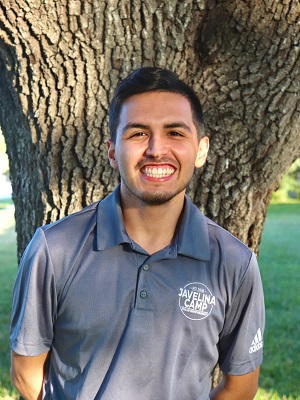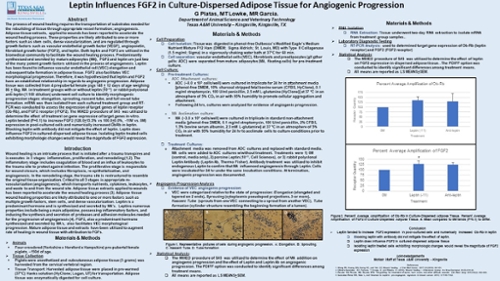The process of wound healing requires the transportation of substrates needed for the rebuilding of tissue through appropriate vessel formation; angiogenesis. Adipose-tissue-extracts, applied to wounds has been reported to accelerate the wound healing process. These properties are likely attributed to one or more factors such as stem cells, dense vascularization, and are regulated through growth factors such as vascular endothelial growth factor (VEGF), angiopoietin, fibroblast growth factor (FGF2), and leptin. Both leptin and FGF2 are utilized in the biomedical community to facilitate the wound healing process. Predominantly synthesized and secreted by mature adipocytes (MA), FGF2 and leptin are just two of the many potent growth factors utilized in the process of angiogenesis. Leptin has been found to influence vascular endothelial cell (VEC) elongation and subsequent tube formation in adipose tissue. FGF2 also facilitates VEC morphological progression. Therefore, it was hypothesized that leptin and FGF2 have an established relationship in regards to angiogenic progression. Adipose tissue was collected from 4 prepubertal female pigs 148 + 12 days of age weighing 86 + 6kg. MA in treatment groups with or without leptin (10-11) or rabbit polyclonal anti-leptin (1:100 dilution) underwent cell culture to identify morphogenic progression stages: elongation, sprouting, nascent tube, and full vessel tube formation. mRNA was then isolated from each cultured treatment group and RT-PCR was conducted to assess the expression of target genes of leptin receptor (Ob-Rb), and FGF2 receptor (rFGF2). The MIXED procedure of SAS was utilized to determine the effect of treatment on gene expression of target genes in-vitro. Leptin tended (P=0.1) to increase FGF2 (128.0+15.5% vs 100.0+0.0%, -11M vs. 0M) expression in pool-cultured cells and numerically increased ObRb in leptin. Blocking leptin with antibody did not mitigate the effect of leptin. Leptin does influence FGF2 in cultured-dispersed adipose tissue.
Faculty Mentor: Dr. Michelle Garcia
Department of Animal Science & Veterinary Technology


